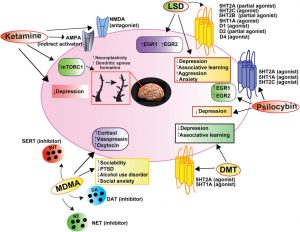Hallucinogenic Drugs may Effectively Treat Mental Illness
By John M. de Castro, Ph.D.
“Combined with psychotherapy, some psychedelic drugs like MDMA, psilocybin and ayahuasca may improve symptoms of anxiety, depression and post-traumatic stress disorder,” – Cristina L. Magalhaes
Psychedelic substances such as peyote, mescaline, LSD, Bufotoxin, ayahuasca and psilocybin
have been used almost since the beginning of recorded history to alter consciousness and produce spiritually meaningful experiences. More recently hallucinogenic drugs such as MDMA (Ecstasy) and Ketamine have been similarly used. People find the experiences produced by these substances extremely pleasant. eye opening, and even transformative. They often report that the experiences changed them forever. Psychedelics and hallucinogens have also been found to be clinically useful as they markedly improve mood, increase energy and enthusiasm and greatly improve clinical depression. The research on the effectiveness of these drugs on mood and mental illness is accumulating. So, it makes sense to step back and summarize what has been learned.
In today’s Research News article “.” (See summary below or view the full text of the study at: https://www.ncbi.nlm.nih.gov/pmc/articles/PMC7880300/ ) De Gregorio and colleagues review and summarize the published research on the brain mechanisms of hallucinogenic drug actions and their effectiveness as treatments for mental illness.
They report that the different drugs have very different effects on the nervous system although most interact with serotonin receptors. The nervous systems effects appear to alter sensory integration and associations with these sensations resulting in altered experiences.
They also report that the published research suggests that psilocybin may be useful in treating anxiety, depression, alcohol abuse, and obsessive-compulsive disorder (OCD), LSD may relieve anxiety and depression, that Ketamine may improve major depressive disorder, and MDMA (Ecstasy) may help in the treatment of post-traumatic stress disorder. Hence, psychedelic and hallucinogenic drugs may be effective in treating mental illness. It needs to be kept in mind that these drugs have powerful effects so they must be administered in controlled environments by trained practitioners.
So, hallucinogenic drugs may effectively treat mental illness.
“Most powerful substances that we know of, that have powerful effects on the central nervous system, are like any powerful tool, They can have dangerous effects, or beneficial effects, if judiciously used in a context where the dangers are known and mechanisms are in place to address them.” – Matthew Johnson
CMCS – Center for Mindfulness and Contemplative Studies
This and other Contemplative Studies posts are also available on Google+ https://plus.google.com/106784388191201299496/posts and on Twitter @MindfulResearch
Study Summary
De Gregorio, D., Aguilar-Valles, A., Preller, K. H., Heifets, B. D., Hibicke, M., Mitchell, J., & Gobbi, G. (2021). Hallucinogens in Mental Health: Preclinical and Clinical Studies on LSD, Psilocybin, MDMA, and Ketamine. The Journal of neuroscience : the official journal of the Society for Neuroscience, 41(5), 891–900. https://doi.org/10.1523/JNEUROSCI.1659-20.2020
Abstract
A revamped interest in the study of hallucinogens has recently emerged, especially with regard to their potential application in the treatment of psychiatric disorders. In the last decade, a plethora of preclinical and clinical studies have confirmed the efficacy of ketamine in the treatment of depression. More recently, emerging evidence has pointed out the potential therapeutic properties of psilocybin and LSD, as well as their ability to modulate functional brain connectivity. Moreover, MDMA, a compound belonging to the family of entactogens, has been demonstrated to be useful to treat post-traumatic stress disorders. In this review, the pharmacology of hallucinogenic compounds is summarized by underscoring the differences between psychedelic and nonpsychedelic hallucinogens as well as entactogens, and their behavioral effects in both animals and humans are described. Together, these data substantiate the potentials of these compounds in treating mental diseases.
https://www.ncbi.nlm.nih.gov/pmc/articles/PMC7880300/
